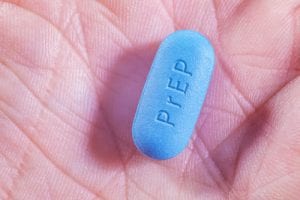This blog outlines the current medical debate surrounding whether the NHS should provide Pre-exposure prophylaxis (PrEP) for HIV, the possible questions regarding PrEP that might come up in an interview setting, and how to tackle them.
What is PrEP?

PrEP is a combination of two medications for HIV, sold under the brand name Truvada. It’s taken either as a pill once daily or “event-based” (before and after sex, although effectiveness when used in this way has only been studied in gay and bisexual men). Daily PrEP has been approved by several countries including the USA, Norway, Australia, Israel, Canada, Kenya, the EU and South Africa.
PrEP should not be confused with post-exposure prophylaxis (PEP). PEP has been provided by the NHS since 2013, whereas PrEP is not. PEP is taken within 72 hours of possible exposure to HIV (unprotected sex, needlestick injury, etc) rather than as a preventative.
The Centre for Disease Control and the World Health Organisation (2014) recommend that PrEP be considered for people who are HIV-negative and in an ongoing sexual relationship with an HIV-positive partner, as well as for any gay or bisexual men who have unprotected sex, or heterosexual men and women who have sex with partners that are at a substantial risk of HIV infection. PrEP is also recommended for people who have injected drugs in the past 6 months and have shared needles, or who have been in drug treatment in the past 6 months.
A UK study (“PROUD”) reported an 86 per cent reduction in HIV infections in gay men taking PrEP. PrEP provides near 100% prevention of HIV infection if taken as prescribed. It also lowers the risk of HIV infection via injecting drug use by over 70%. PrEP is currently obtained only by private prescription in the UK, costing around £400 a month. Some UK clinics offer PrEP at the cost of the drug, however there are regional variants in price and often this varies on the pharmacy or clinic.
In May 2016, NHS England’s specialist services commissioning committee decided not to provide PrEP, saying it lacked power to do so. This decision was taken to court by the National AIDS Trust, who in August won their case, and it was ruled that the NHS does have the power to provide PrEP under the 2006 NHS Act and the 2012 Health and Social Care Act. NHS England is currently appealing against this ruling, hoping that the appeal will legally declare that provision of PrEP services fall outside NHS England’s legal powers.
NHS England is arguing that as PrEP is a preventative drug, its provision is the responsibility of local councils. It should be noted that NHS England’s opinion is not held by all medical professionals – many have campaigned for the provision of PrEP by the NHS, and England’s Chief Medical Officer Dame Sally Davies has said, “Whatever one thinks about it morally or anything, I can tell you it is a cost-effective public health intervention, so I do believe our system should fund it. You save infections and therefore money, and it has been thoroughly checked.”
Lifetime cost of HIV infection to the NHS can be up to £380,000, and research argues that providing PrEP, even if there was very low usage, would still be cost effective in the long term.
The arguments surrounding PrEP are found elsewhere as well. The NHS is frequently challenged on whether it should provide (preventative) treatment for conditions which could be avoided through behaviour change – whether that’s smoking, alcohol use, contraception, metabolic surgeries and so on. You may be asked about your opinion on any of these during your interview, so it’s worth taking your time to read around the subject and formulate opinions.
Oftentimes it is not so simple as ‘changing behaviour’ – for instance, smoking is higher in working class and minority groups as a method of combating stress, and removing treatment for smoking addiction from the NHS would target these groups predominantly – is that fair?
However, the NHS has finite resources. Should treatments be provided on a subjective idea of what moral purity is? And is the idea of moral purity when it comes to health inherently problematic? (I would argue yes – but this isn’t my argument to make, it’s yours, and these are your opinions to consider.)
What kinds of questions would I be asked about PrEP in an interview?
- Should the NHS fund the prescription of PrEP, and under what circumstances?
- What responsibility does the NHS have to provide preventative medication and treatment?
- What arguments are there for and against the provision of PrEP by the NHS, and what’s your opinion?
- What role does the NHS play in establishing what is moral behaviour?
- Are private prescriptions ethical? Should certain medications only be available to those who can afford them?
How would I approach a PrEP question?
Lay out the pros and cons of the NHS providing PrEP, and the arguments on both sides. The interviewers will want to hear your opinion, although do avoid insensitive comments about sexuality, HIV-positive individuals or intravenous drug use. Here’s some of the main things you may want to mention:
- The financial cost and benefit
- The role of prevention in disease
- How effective PrEP is
- Whether there is a moral opinion, and if so whether this should be taken into account.
- The role of medical ethics, especially the principles of justice and beneficence.
- Whether the NHS or local councils are responsible for preventative medicine
References/Further Reading:
- Centre for Disease Control and Prevention: What is PrEP?
- I Want PrEP Now
- What is PrEP?
- Terrence Higgins Trust: PrEP
- NHS England: August 2016 update on PrEP
Words: Riley Botelle
